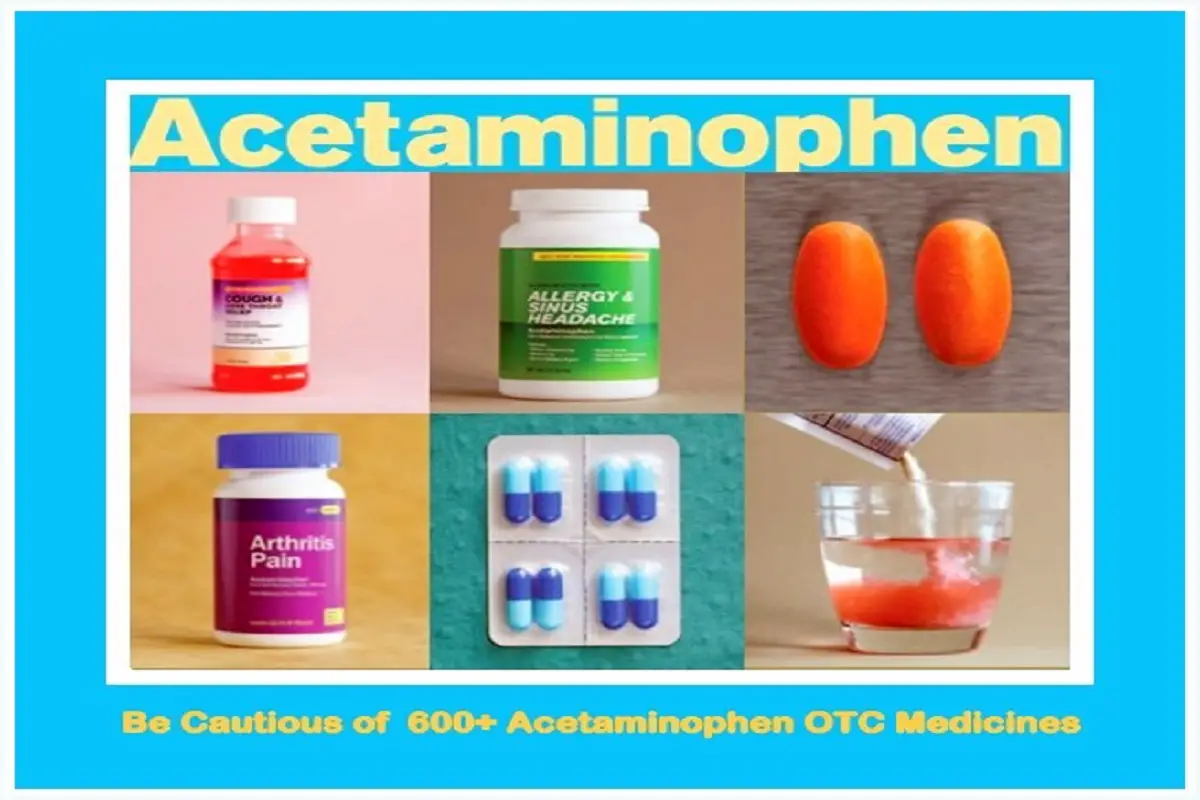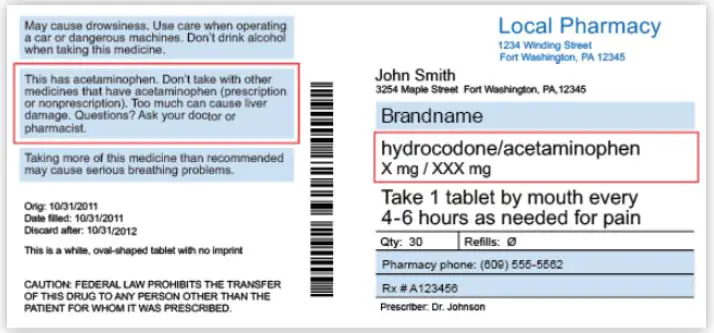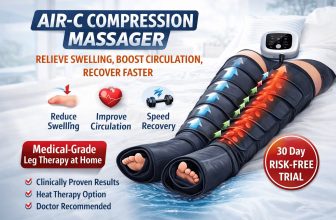Learn The Potential Side Effects of Acetaminophen

Learn The Potential Side Effects of Acetaminophen: Doubling 4000 Mg Of Acetaminophen Can Lead To Poisoning & Liver Damage
Almost 46% of American adults risk overdosing on acetaminophen, a key ingredient in over 600 over-the-counter medications and prescriptions, including pain relievers, sleep aids, and popular store brands like Tylenol (Regular and Extra-strength) and cold and cough medications for adults and children.
Most pain relievers contain acetaminophen. It is one of the common drugs in pain relievers. It is available in 325 mg, 500 mg, or 600 milligrams each serving, as in each pill in many over-the-counter drugs. Children or pediatric acetaminophen contains 160 mg to 80 mg each serving.
There are many instances where parents administer adult acetaminophen to their children unwillingly and unknowingly of the potential adverse effects. Each year, acetaminophen toxicity or overdose of it is responsible for 500 deaths and 56,000 cases of a medical emergency in the U.S.
What Is The Purpose Of Using Acetaminophen?
Acetaminophen is used for the purpose of controlling chronic pain and giving temporary relief from colds and coughs. Women also take over-the-counter pain relievers containing acetaminophen to get temporary relief from menstrual and premenstrual cramps.
Children and infants are also recommended by healthcare providers to take particular infant liquid acetaminophen OTCs to reduce fever or toothaches. Seniors take acetaminophen OTCs to get relief from arthritis.
What Are Some Common OTC Medicines Containing Acetaminophen?
There are over 600 different store brands and over-the-counter medicines containing acetaminophen. Some common prescription drugs and OTCs are as the following:
| Over-the-Counter medicines with acetaminophen | Prescription medicines with acetaminophen |
| NyQuil | Hydrocet |
| DayQuil | Locet |
| Liquiprin | Norco |
| Saint Joseph Aspirin-Free | Excedrin |
| Panadol | Percocet |
| Sudafed | Tylenol PM |
| Formula 44 | Ultracet |
| Alka-Seltzer Plus | Vicodin |
| Robitussin | Hydrocodone Bitartrat |
| Other store brands | Other generic drugs |
For children, there are two types of pediatric acetaminophen products in the U.S:
- Liquid concentrated products contain acetaminophen of 160 mg/5 ml.
- Chewable tablets and pediatric acetaminophen tablets contain 80 mg acetaminophen strength.
Why Can Acetaminophen Be Dangerous?
A normal dose of acetaminophen is safe, and the body can break it down and pass it through urine. However, some acetaminophen drugs and brands convert into byproducts toxic to the liver.
Taking too much acetaminophen or accidentally overdosing can create more toxin build-ups inside your body. Your body won’t be able to handle such toxin build-ups, and such toxin overload can affect your metabolism and slowly cause your health to deteriorate. A long-term side effect is acute liver damage.
Each year, several cases point out that acetaminophen overdose leads to death. Most of the cases relate to accidentally overdosing on Tylenol and drugs containing acetaminophen.
What Are The Consequences Of Overdosing On Acetaminophen?
The consequences of taking more than the recommended dosage are acute liver damage leading to severe liver damage and liver transplant.
Taking acetaminophen may also cause rare side effects like severe skin reactions if you have an allergy. The symptoms include rash and skin redding. You must stop using it if you notice such symptoms. You may also experience drowsiness, and that’s why it is not recommended to be extra cautious when driving a car or operating any machine after taking acetaminophen.
How Much Acetaminophen Is Too Much, And What Is The Recommended Dosage?
For healthy adults weighing 150 pounds, taking more than 4000 mg or four grams of acetaminophen a day is not recommended by the U.S. Food and Drug Administration. Taking more than four grams of acetaminophen in 24 hours can result in serious health consequences.
Extra-strength Tylenol contains 500 mg acetaminophen in each pill. If you take two Tylenol extra-strengths twice a day to get relief from any pain – you risk overdosing and severe health consequences.
That’s because taking 4 extra-strength Tylenol means you are taking 4000 mg of acetaminophen, which is not at all recommended by doctors. However, taking six Extra-strength Tylenol pills containing 500 mg of acetaminophen a day is safe for a healthy adult for ten days.
For some adults, taking acetaminophen every day for an extended period poses a severe risk of liver damage. That said, acetaminophen is an important drug, especially for seniors suffering from arthritis and chronic pain.
It is not even safe for some adults to take 4000 mg of acetaminophen a day. Dr. Melisa Becker recommends sticking to 3000 mg of acetaminophen a day, especially if you take acetaminophen every day.
So, what can you do when you want relief from that severe tooth pain, headaches, or that throbbing back pain?
It is best to stay within limits by sticking to the lowest dose and talk to your healthcare provider if you want to give up acetaminophen. Keep reading to learn how to stay safe when using acetaminophen.
Precautionary Steps: Read The Label And Know The Amount Per Serving.
It is important to read the label explaining the purpose of the medicine, the warning, the recommended dosage, and the directions of use. Note that Acetamin is the same ingredient as acetaminophen, and so is APAP (the abbreviated format of acetaminophen). So read the label and know the amount of acetaminophen present per serving.
Rx medicines containing acetaminophen lists the ingredient as follows:

Source: Knowyourdose.org
When Should You Be Extra Cautious And Talk To Your Doctor Before Taking Acetaminophen?
Before taking acetaminophen, you should talk to your doctor if:
- You drink alcoholic drinks two to three times a day (men).
- You drink one alcoholic drink a day (women).
- You have liver disease.
- You are taking warfarin or blood thinners.
- You are pregnant or breast-feeding
- You are already taking another medication containing acetaminophen
When To Stop Taking Acetaminophen?
Stop using acetaminophen and ask a doctor if:
- Fever worsens or lasts more than 72 hours.
- Pain worsens or lasts more than 10 days
- New symptoms occur
- Redness or swelling is present
- Skin allergy triggers
What Should You Do In Case Of Accidentally Overdosing On Acetaminophen?
You should seek medical attention immediately, right away. If you accidentally take two types of acetaminophen medicines, you must seek emergency medical support.
You may also contact a Poison Control Center in your state if you have taken more than 4000 mg of acetaminophen or call 911.
If you have any questions about the medicine, you can call the toll-free number on the medicine label.
Can You Give Adult Acetaminophen Concentrations To Infants And Children?
No. You should never give an adult concentration of acetaminophen medicines to infants or children. You must follow the recommended dosage. Please check the recommended dosage of children’s acetaminophen dosage from the following section.
| Child’s age and weight | Infants’ acetaminophen suspension liquid 160 mg/5 ml | Children’s acetaminophen suspension liquid 160 mg/5 ml | Children’s acetaminophen tablets – 80 mg | Children and junior’s acetaminophen tablets – 160 mg |
| 2-3 years
24-35 lbs |
5 ml (tsp) | 5 ml (1 tsp) | 2 tablets | 1 tablets |
| 4-5 years
36-47 lbs |
Ask a healthcare provider | 7.2 ml (1 ½ tsp) | 3 tablets | 1 – ½ tablets |
| 6-8 years
48-59 lbs |
Ask a healthcare provider | 10 ml (2 tsp) | 4 tablets | 2 tablets |
| 9-11 years
72-95 lbs |
Ask a healthcare provider | 12.5 ml (2 ½ tsp) | 5 tablets | 2-1/2 tablets |
Even if you don’t find your child’s dosing cup, you should never administer a smaller amount of adult acetaminophen to children for the sake of relieving pain. In case you have accidentally administered adult acetaminophen to your children, take immediate medical support or call 911.
Sources:
- OTC Pain Relief: Understanding Acetaminophen (Accessed at https://www.webmd.com/pain-management/features/pain-relievers-acetaminophen)
- Acetaminophen Safety: Be cautious but not afraid. (Accessed at https://www.health.harvard.edu/pain/acetaminophen-safety-be-cautious-but-not-afraid)
- Acetaminophen Awareness Coalition. (Accessed at knowyourdose.og)
- Tylenol Overdose or Poisoning (Accessed at https://www.verywellhealth.com/careful-not-to-od-on-acetaminophen-1124125)
- National Library of Medicine: Acetaminophen Toxicity (Accessed at https://www.ncbi.nlm.nih.gov/books/NBK441917/)





